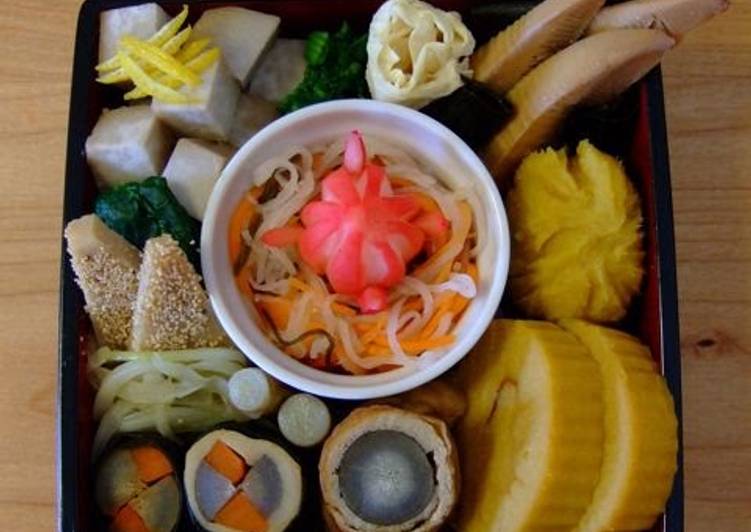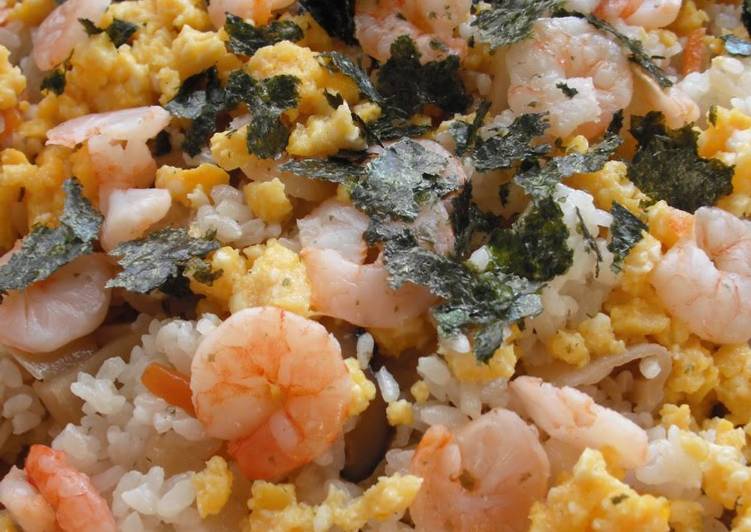
Hey everyone, I hope you are having an amazing day today. Today, I’m gonna show you how to make a distinctive dish, egg-free macrobiotic date-maki veggie osechi. It is one of my favorites food recipes. For mine, I am going to make it a bit unique. This will be really delicious.
Since my daughter has food allergies, I make all of the New Year's osechi dishes from I like to make my simmered vegetables separately. Osechi Ryori are the traditional foods enjoyed on New Year's day in Japan. They come in an assortment of colorful dishes packed together in special boxes called jubako, which resemble bento boxes.
Egg-Free Macrobiotic Date-maki Veggie Osechi is one of the most favored of recent trending meals on earth. It’s easy, it’s quick, it tastes yummy. It is enjoyed by millions daily. They’re nice and they look fantastic. Egg-Free Macrobiotic Date-maki Veggie Osechi is something that I’ve loved my whole life.
To get started with this particular recipe, we must prepare a few components. You can cook egg-free macrobiotic date-maki veggie osechi using 10 ingredients and 8 steps. Here is how you cook it.
The ingredients needed to make Egg-Free Macrobiotic Date-maki Veggie Osechi:
- Get 1/2 block Drained tofu
- Prepare 130 grams Kabocha squash (steamed, peeled and mashed)
- Make ready 90 grams Japanese yam or nagaimo yam (peeled)
- Take 2 tsp Beet sugar
- Take 1 generous teaspoon Maple syrup (optional)
- Make ready 1/3 tsp White miso
- Prepare 1 pinch Natural sea salt
- Get 1 tbsp Kudzu powder
- Prepare 1 tsp Soy sauce
- Get 5 Dried wheat gluten (if using nagaimo yam)
From ancient times, humans have held festivals to call upon the gods, and Osechi is a food made just for the lunar new year in particular. Another example of Osechi in three-tiered box. Osechi-ryōri (御節料理, お節料理 or おせち) are traditional One of the meanings associated with the second kanji includes "fashionability," derived from the illustrious dress of the samurai from Date Han. For women who want to save their unfertilized eggs for a possible future pregnancy, egg freezing is a method for doing so.
Instructions to make Egg-Free Macrobiotic Date-maki Veggie Osechi:
- Note: If using nagaimo yam, pulse the dried wheat gluten in the food processor, then set aside, before introducing the kudzu powder.
- Break up the clumps of kudzu powder with a mortar and pestle or in a food processor. Add the Japanese yam (or nagaimo yam), and mash/pulse until smooth.
- Add the drained tofu to the mixture and mash/pulse until it reaches an even consistency.
- Add the steamed, peeled, and mashed kabocha and the rest of the ingredients, and mash/pulse.
- Preheat the oven to 170℃, pour the mixture into a Swiss roll cake pan roughly 250 mm x 17 mm in size, and bake for about 40 minutes.
- Transfer to a bamboo sushi mat fresh from the oven, roll it up, then let it cool. Do not remove the sushi mat until after it cools.
- Once the roll cools, wrap it in plastic wrap (without removing the sushi mat), then slice before serving.
- In Step 3, if the mixture appears too moist, or is not fluffy enough, add small amounts of powdered dried wheat gluten (pulverized in a food processor) until it thickens.
Scarica subito la foto Cucina Giapponese Osechi Kamaboko E Datemaki. Continua la ricerca nella raccolta di iStock di immagini stock royalty-free con foto di Cibo pronte per essere scaricate in modo semplice e rapido. Need an egg dish for breakfast? MORE+ LESS Quickly pour egg mixture into pan. While sliding pan back and forth rapidly over heat, quickly stir with spatula to spread eggs continuously over bottom of pan as they thicken.
So that is going to wrap this up for this exceptional food egg-free macrobiotic date-maki veggie osechi recipe. Thanks so much for reading. I am confident that you will make this at home. There’s gonna be more interesting food in home recipes coming up. Don’t forget to bookmark this page on your browser, and share it to your family, friends and colleague. Thank you for reading. Go on get cooking!

